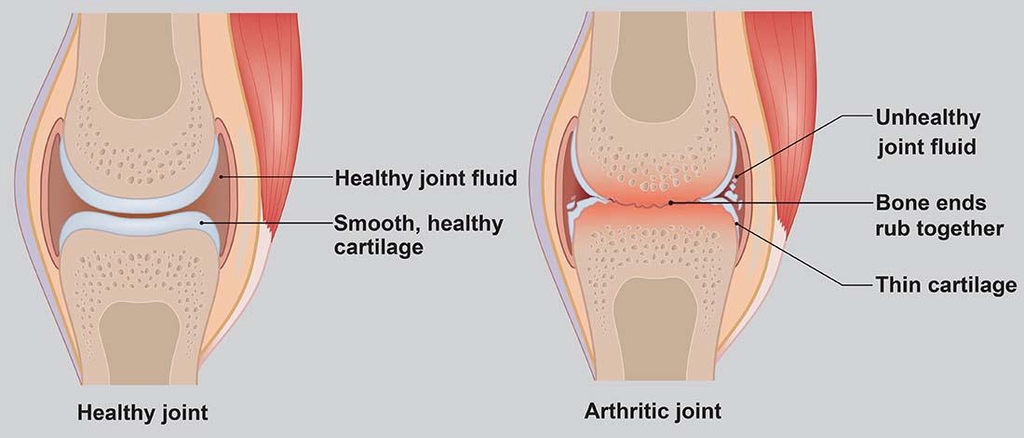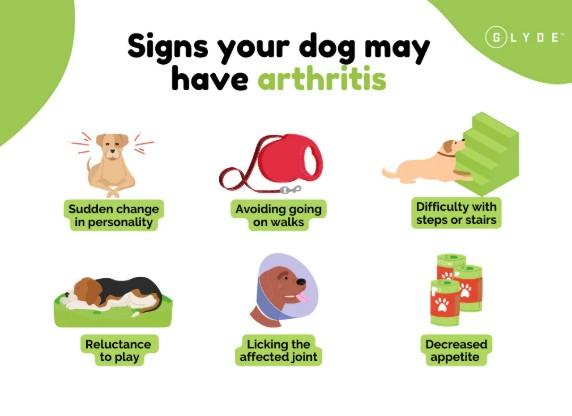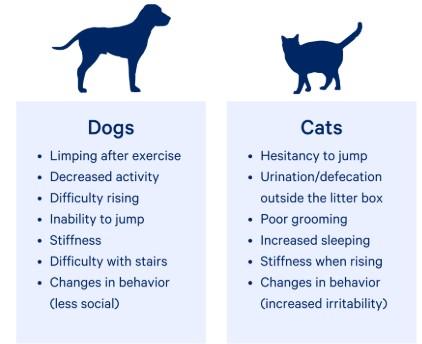Arthritis
Arthritis (osteoarthritis) is a common condition that causes painful, stiff and swollen joints and it can make moving around uncomfortable and difficult. Arthritis does get progressively worse over time as there's no cure for it - however, there are treatment options available as well as ways of trying to keep the joints as healthy as possible. Here are some answers to some common questions:
What is arthritis?
It is a condition which affects the joints and causes them to become painful and swollen. Within a healthy joint, there's a smooth surface which allows the joints to glide past each other when moving. When the joints have a worn surface, the gliding stops and the bone surfaces start to rub on each other. Eventually, the affected joints because stiff and thickened as they start to produce new bone which isn't required. That extra bone causes more pain when moving. See diagram at the bottom of this page to visualise a healthy joint vs an arthritic one.
What are the symptoms?
- Stiffness, particularly after a walk or rest
- Slowing down on walks
- Quieter than normal or being a bit grumpy
- Lethargy
- Licking of the affected limbs
- Reluctance when jumping
- Enlarged joints
- Not wanting to climb stairs
What causes this?
General wear and tear throughout life - elderly animals are much more prone to arthritis than a younger animal.
However, genetics are also a factor to consider. Certain breeds of dogs are at an increased risk of developing arthritis. These breeds include:
- Labradors, Springer Spaniels, Rottweilers and Bernese Mountain Dogs mainly for their hips and elbow
- German Shepherds mainly for their spine, hips and elbows
- Golden Retrievers mainly for the hips
(other limbs and joints can be affected)
Abnormal shaped bones and cartilage as well as previous injuries can also be a factor when it comes to arthritis.
What treatment is available?
Once the veterinary surgeon has assessed your pet and diagnosed arthritis, they can prescribe your pet some pain relief and also consider doing surgery such as an arthodesis (joint fusion) or replacements. These surgeries usually require an orthopaedic surgeon so sometimes a referal practice is needed.
You vet may prescribe Librela for dogs or Solensia for cats. This is a monthly injection.
Other forms of treatment include hydrotherapy and joint supplements. Supplements are not a replacement for prescription medication but they can be used alongside most of them - however, these supplements may not work for all pets.
How can I care for my arthritic dog at home?
- Controlled, regular walks but keeping them short as a sudden increase in exercise can cause more of a flare up
- Keeping your pets slim - being overweight has a huge impact on joints!
- Orthopaedic beds
- Covering over slippery floors
- Keeping your pet warm
How do I prevent arthritis?
- Weight control - keeping your pet slim so there's no extra strain on their joints
- Regular exercise - keep muscles strong, taking some of the strain off their joints
- Good quality food - sticking to life stage food, at the correct ages and have a big impact
If you think your pet may be suffering from arthritis, please contact your veterinary practice to book a consultation and make a plan going forward.



